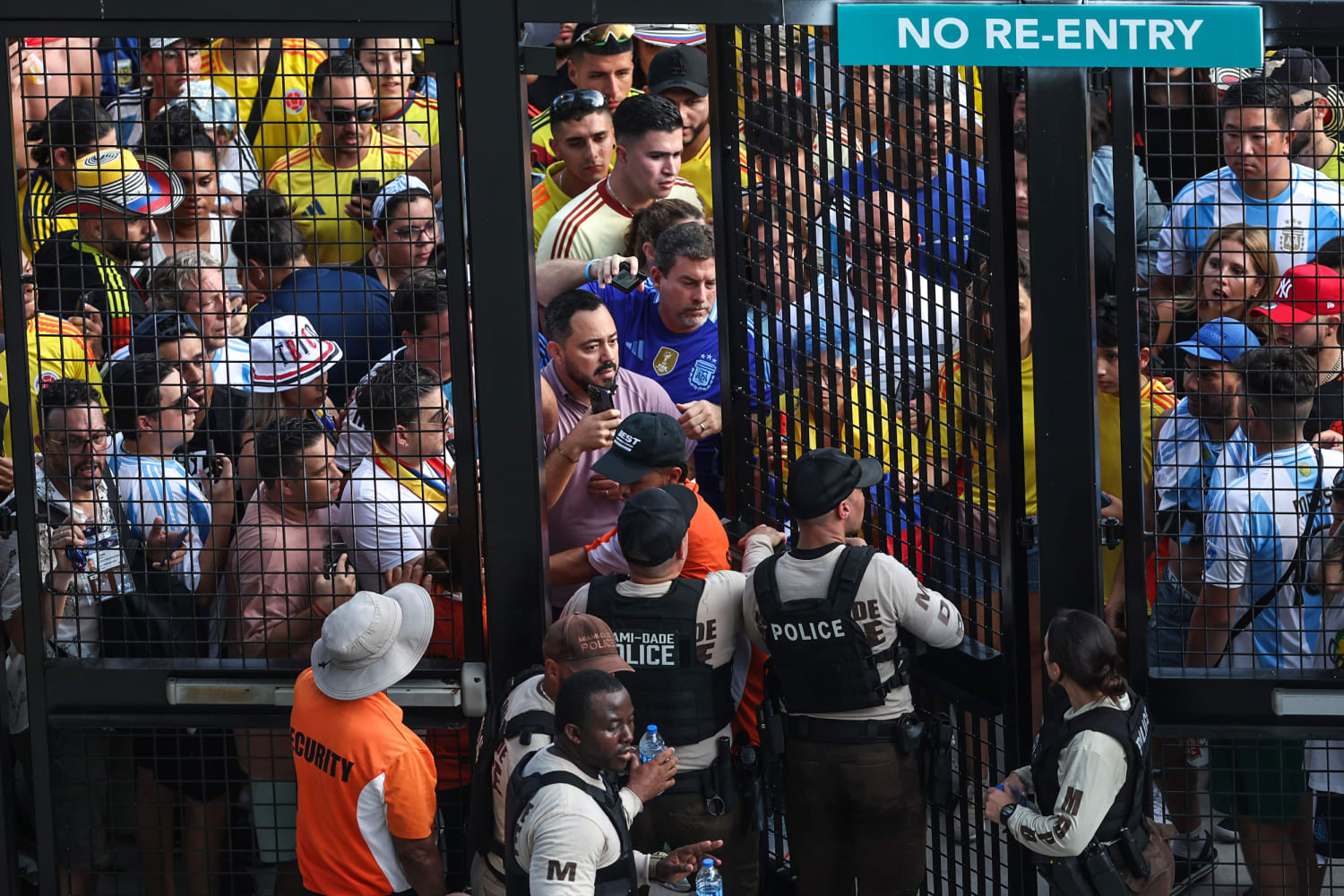The highly anticipated Copa América final between Argentina and Colombia at Hard Rock Stadium in Miami was marred by significant delays on Sunday due to chaotic scenes at the stadium’s entry gates. The event, which drew thousands of passionate soccer fans, highlighted serious concerns about crowd management and security, particularly as the United States prepares to host the 2026 FIFA World Cup.
Fan Chaos at Gates
The trouble began when “thousands” of fans attempted to force their way into the stadium through closed entry gates. Videos circulating on social media depicted large crowds of fans packed tightly outside the fences, struggling to gain entry. This situation quickly escalated, creating a volatile atmosphere as security personnel tried to maintain order.
The exact number of ticket-holding fans caught in the chaos remains unclear. However, CONMEBOL, the governing body for South American soccer, issued a statement urging attendees not to attempt entry without tickets. In a similar vein, the Miami-Dade Police Department called for patience among fans, emphasizing the need to maintain order and safety during the event.
The situation grew more tense as the minutes ticked by, with fans becoming increasingly frustrated as they waited under the intense Miami heat. Temperatures remained above 85 degrees Fahrenheit even after sunset, raising concerns about dehydration and health risks for those waiting outside. The New York Times reported on the growing concern for fan safety as the crowd situation continued to worsen.
Impact on Players and Fans
The chaos at the gates not only disrupted the fan experience but also had a significant impact on the players and their families. According to FOX’s Jenny Taft, some players faced difficulties in getting their families into the stadium amidst the disturbances. The delay affected the teams’ warm-up routines, as players were forced to leave the field multiple times. The delay and uncertainty surrounding the start of the match added to the already high tension of the final.
Additionally, the prolonged waiting time under the sweltering heat posed serious health risks. Dehydration became a major concern, with medical staff on high alert to assist those in need. The situation highlighted the importance of having adequate medical and security staff on hand to manage such large-scale events, especially when unforeseen circumstances arise.
Match Delay and Rescheduled Kickoff
Originally scheduled for an 8 p.m. ET kickoff, the match was delayed multiple times as the situation at the gates unfolded. The final kickoff time was rescheduled to 9:15 p.m. ET, with players returning to the field around 8:40 p.m. ET to continue their warm-ups. This delay not only disrupted the players’ preparations but also added to the frustration of fans who had been eagerly awaiting the match.
For both teams, the delay meant adjusting their mental and physical preparation routines, which can be crucial in a high-stakes game like the Copa América final. The match eventually proceeded without further incident, but the initial chaos left a lasting impression on everyone involved.
Security Concerns for Future Events
The events at Hard Rock Stadium, coupled with a previous incident during Colombia’s semifinal victory over Uruguay at Bank of America Stadium in Charlotte, have raised significant concerns about the security and safety protocols at major international sporting events in the United States.
As the country prepares to host the 2026 FIFA World Cup, these incidents could prompt both American and FIFA officials to reassess and potentially overhaul venue safety policies.
Effective crowd management is critical in ensuring the safety of both fans and players. This is especially true for events that attract large international audiences, where the stakes are high, and emotions can run deep. The U.S. will need to take lessons from these incidents to ensure that future events, particularly the World Cup, are not only successful but also safe for all attendees.
For a detailed analysis of how these security challenges could impact future events, visit Global Sports Vista, where we dive into the implications for the upcoming FIFA World Cup and other major sports events.
Looking Ahead: Lessons for the 2026 FIFA World Cup
The chaos at the Copa América final serves as a critical reminder of the importance of robust security measures and efficient crowd management at major sporting events.
With the 2026 FIFA World Cup on the horizon, the United States, along with FIFA, must ensure that lessons are learned from the incidents in Miami and Charlotte. This means reassessing current security protocols, enhancing collaboration with local law enforcement, and possibly rethinking stadium entry processes to prevent similar occurrences.
Fans expect not only a thrilling sporting experience but also a safe and organized environment where they can enjoy the game without undue stress or danger. For event organizers, this is a challenge that must be met with careful planning, resource allocation, and a commitment to continuous improvement in safety measures.
As the global soccer community turns its attention to the U.S. in the lead-up to 2026, there is a unique opportunity to set new standards for safety and fan experience at large-scale sporting events.
For the latest updates on international sports events and insights into event security, visit JW7, where you can also explore the latest opportunities in the gaming world.



